36 Pros and Cons of Living in Hong Kong as an Expat
Analyzing the pros and cons of living in Hong Kong can be difficult before you even step foot in the city. Typically, my approach is a bit of a haphazard one where I just show up and hope that it works out. Luckily, that has worked out in almost every single city (and country) that I’ve lived in. It worked out so well in Hong Kong that it is somewhere I’ve called home for the last three years (and six-plus in total) – with no intention of leaving (at least for now).
This isn’t a symmetrical pros and cons of living in Hong Kong type of list, where I list a positive and then counter with a related negative. It’s strictly just a list of pros and cons that have come to the top of my dome, with several thoughts, anecdotes, and tips to accompany each. Each pro and con could be a blog post in itself but for the sake of brevity, I’ll keep it (relatively) digestible.
So, if you’re curious about what I love most about living in the aptly named Fragrant Harbor and what I’m not as enthusiastic about, then here are 36 pros and cons of living in Hong Kong as an expat.
Pale Ale Travel Note: If you are considering moving to Hong Kong (or traveling here) and have further questions about any of the pros and cons on the list, feel free to reach out to me and I’m more than happy to dive into them in greater detail!
| Pros of Living in Hong Kong | Cons of Living in Hong Kong |
| High salaries and an abundance of professional opportunities (specifically in finance and law) | Extremely high cost of living |
| Fantastic public transportation | Volatile political landscape and erosion of fundamental rights |
| Easy access to nature (beach, mountains, etc…) | One of the largest wealth gaps in the world |
| Vibrant and affordable wet markets | Overpriced Western restaurants and cuisine |
| One of the safest cities in Asia (and the world) | No digital nomad visa |
Pro: High Salaries & Professional Opportunities
Possibly the most compelling reason for expats to move to Hong Kong is that this city is flush with high salaries, professional opportunities, and low taxes (I’ll get to the latter down below). Is it as favorable a market for expats as say pre-pandemic or even pre-democracy protests? Of course not. However, there still aren’t many other cities on earth offering up these astronomical salaries that have become “par for the course” and something people in the city rarely bat an eyelash at.
According to ECA International, a U.K.-based data and software services consultancy, the average Hong Kong expat package (in 2022) was valued at just under HK$2.2 million per year, allowing it to regain a top five position globally for expat pay and benefits packages. For reference, that’s just under USD 300,000 per year.
There is some outrageous money to be made in this city. Am I one of the prime candidates for this pro on the list? Absolutely not. But I do get to benefit from the underlying inadequacy I feel when I shake hands with an exotics trader at J.P. Morgan or partner at Clifford Chance, so trust me on this one.
Pale Ale Travel Tip: Sometimes a traditional job isn’t enough to pay the bills in Hong Kong. Make sure to check out my post breaking down the best side hustles in Hong Kong that you can start today and with minimal or no upfront costs.
Con: Cost of Living
Hong Kong wouldn’t offer such attractive expat packages and benefits if it wasn’t such a prohibitively expensive city to live in otherwise. The Economic Intelligence Unit’s 2022 ‘Cost of Living’ survey places Hong Kong at number four on the list for highest living costs, while a 2023 Mercer study actually ranked Hong Kong as the number one most expensive city for expats (ahead of Singapore).
Of the countless Asian (and European) cities that I’ve lived in, Hong Kong takes the cake when it comes to rent, necessities, and entertainment expenses. From sky-high rents and international school costs to overpriced Western restaurants and (surprisingly) wallet-crippling butternut squash prices (yes, as a New Englander this is an important staple in my diet), it can feel like you’re always staring at zeros in your bank account when in this city. When setting a budget, double it – just to be safe. This is one city where things can escalate quickly financially (and not in a positive way).
A word of warning: I would take whatever “cost of living” ranges you see websites like Numbeo give you, as I generally find them to be quite out of touch with reality and far more conservative in pricing/cost estimates.
For further reading, make sure to check out my post breaking down how much it costs to rent an apartment in Mid-Levels.
Pro: Unparalleled Convenience & Public Transportation
Coming from the boondocks of New Hampshire where driving at least 45 minutes just to grab a bite to eat or see a friend is the norm, Hong Kong’s convenience and transportation make my hometown look like an Amish village – horse and buggy and all.
Hong Kong boasts an extensive metro (the MTR) that can get you to nearly any corner of the city, bus lines and minibus routes out the wazoo (my preferred mode of transportation), more taxis than you can shake a stick at, breathtaking Star Ferry (for cross harbor trips), and the iconic ‘Ding Ding’ tram which runs from East to West and vice versa across Hong Kong Island (from Kennedy Town to Shau Kei Wan). The William Russell Global Transport Index ranks Hong Kong as the third best city in the world for public transport, ahead of both New York City and London, citing its affordability and extensive rail line options and bus networks.
Simply put, Hong Kong’s public transport is clean, affordable, efficient, and reliable – everything you could ask for when making that morning commute to talk watercooler politics with Ryan in accounting.
For reference, I live in Mid-Levels (on Hong Kong Island) and am a stone’s throw away from the major financial centers in the city. My old man lives out in Sai Kung in the New Territories, roughly 25 km away from me. I can be out there, shaking his hand and discussing math disappointing him with my lack of math knowledge (a favorite pastime of his) in just over an hour (via public transport – MTR and minibus) or 40 minutes via taxi.
Pale Ale Travel Note: One side effect of this convenience and accessibility to almost anywhere across the city is that I’ve noticed people are actually less proactive and lazier when it comes to meeting up. In New Hampshire, it’s ingrained in your DNA that you have to drive 30 minutes (or more) to grab a burger from Wendy’s or see a movie, so no one thinks twice. Here, if you ask a friend to travel from Wan Chai to meet you in SoHo (2 stops on the MTR), you’ll find a surprising amount of hemming and hawing.
Con: Apartment Hunting
Having just recently gone through this again (back in July and August), what a pain in the ass this process was. Apartment hunting in Hong Kong is arduous, stressful, and far more difficult than it should be. Then tack on the fact that you are likely paying far more than you’re comfortable for a shoebox-sized apartment.
In my experience, most agents have been surprisingly unhelpful and really fail to actually listen to your needs, instead showing apartments that are out of your budget in hopes that you’ll acquiesce and shell out more dough. I’m looking at you Robert (which I felt especially let down by since Robert is my middle name). Further, landlords are relatively stubborn and shortsighted, often difficult to negotiate with due to (a) owning the apartment outright (with no mortgage) and (b) paranoia over public rental listing data and its effects on future rental prices.
In my humble opinion, there’s a delusional disconnect (by landlords) from the reality of the rental market – especially post-pandemic and protests.
Apartments that I viewed back in July and August and made offers on (15% under the listing price – which is relatively standard) are still sitting unoccupied nearly 3 months later. One apartment I made an offer on has been unrented since the beginning of 2023 – all because of an extra few hundred dollars (USD) per month that they wouldn’t budge on.
My major tip for apartment hunting is that you need to be the one driving the search and establishing boundaries from the beginning. Otherwise, it is easy to get walked all over. Be ready to move on if there is resistance and ensure that you have a hotel and/or Airbnb lined up so as not to feel in a major rush to move into anything just for the sake of doing so.
Pale Ale Travel Tip: During my month-long apartment hunt, I was lucky to stay at a hotel that felt at home (as it was 3 feet away from a previous residence of mine) and took some of the commuting pressure off when viewing apartments. For more about that experience, make sure to read my post answering ‘Should You Stay at the Bishop Lei International House?’.
Pro: The City Runs 24/7
No matter how often I tell myself, “Today’s the day you’re going to wake up early,” it rarely happens. And, among other reasons, it’s because Hong Kong is a thriving, bustling city that runs 24/7. There’s a palpable energy at all hours of the day (and night) that has me coming back for more and still as much in love with this city as the first day I arrived.
Want a traditional dim sum experience at 3 AM in Kennedy Town? Or how about a pint (or tequila shots) at a sports bar or electronic club that doesn’t actually close (it just changes staff for the morning)? Or maybe you want to burn some calories on a late-night or early-morning hike? That’s within your grasp as well.
You name it, you can do it – and at almost any hour of the day. This city never sleeps.
Pale Ale Travel Tip: Do you have your next city nailed down between Hong Kong and Taipei? Make sure to check out my comprehensive guide breaking down Taipei vs. Hong Kong For Expats to learn about the cost of living, professional opportunities, quality of life, and more.
Con: Mass Exodus of Locals & Expats
It should be no surprise that people value stability, predictability, and harmony in their pursuits of a sustainable life. The post-97 Handover back to China has been a contentious time for locals, expats, and everyone caught somewhere “in the between.” It’s undeniable that there’s an underlying political tension that exists and is growing more discernible by the year – especially as we close in on the full return to China in 2047 – where the political, economic, and social mechanism of ‘One Country, Two Systems’ may be buried with the likes of my dead hamster and great great great uncle Thomas Jefferson.
I moved back permanently to Hong Kong at the height of the pandemic in 2020. This was the straw that broke the camel’s back for more than a handful of my friends. From a friend group that was heavily dominated by other Americans, Canadians, and Brits when I first arrived, very few remain. I even had one of my best buddies (an American) up and leave with his family after 20-plus years in the city he loved, married in, raised children in, and learned the language (fluently) in, citing political instability and decline in the quality of living.
Among Hong Kongers, more than 100,000 residents made a beeline for the U.K., Canada, and other countries between mid-2020 and mid-2021 (according to the Census and Statistics Department). 2022 saw a significant drop and emigration increase for the third straight year in a row, with over 60,000 residents having packed up and left, citing stringent pandemic measures and the National Security Law as driving causes.
I should note that departures aren’t purely politically motivated either. Hong Kong is a city where an overwhelming majority come in to make their money and leave for (a) greener financial pastures such as Singapore or (b) a quieter, more stable existence to enjoy that pile of cash.
Pro: Low Tax Rates
When I mention that I’m self-employed and work in Hong Kong but don’t have any Hong Kong or Chinese clients, most people ask me why I’m even here. Well, here’s your answer.
Considered one of the major tax havens across the globe, Hong Kong residents (basically anyone working in the city) enjoy a progressive tax rate that ranges anywhere from 2% to 17%, with no taxes necessary for foreign-earned income. Corporate tax clocks in at either 8.25% (up to HKD$2 million) or 16.5% (exceeding HKD$2 million), depending on the year’s earnings. As an American who runs his own business, this is music to my ears (and bank account). Further, Hong Kong doesn’t tax capital gains, interest, or dividends.
Let’s take a second to reflect on this (with my poor math skills and zero real understanding of financial concepts). Say you earn USD 100,000 in New York City and are taxed at nearly 30% (NYC, state, and federal), you take home USD 70,000 (give or take several thousand). That USD 100,000 in Hong Kong will be taxed around 17% (roughly), meaning you take home USD 83,000. I’m not saying that the high cost of living in this city is fantastic but having that extra bit of money in my bank account at the end of the month/year does help with those $20 butternut squashes and $12 Aperol spritzes.
For shopaholics, Hong Kong doesn’t impose a sales tax on goods purchased in the city, which is also (partly) why I love it – as it reminds me of my home state (New Hampshire) which also boasts zero sales tax. However, instead of Bay Staters driving across the border to purchase tax-free tobacco and liquor, it’s typically travelers from all across Asia (and the world) purchasing luxury goods.
Pale Ale Travel Tip: A fun fact about taxes in Hong Kong is that they are typically paid in two installments (they may, however, be paid in one): (1) the tax for the previous year and (2) a provisional tax based on your previous year’s earnings of anticipated income and earnings for the upcoming year which is then credited against the actual salary/earnings for the year.
Con: Political Turmoil & Uncertainty
To quote Shylock from The Merchant of Venice when trying to enforce his debt of cutting one pound of flesh from Antonio, “I crave the law.” I too crave the law. The rule of law. This sadly no longer exists in Hong Kong. The Hong Kong judiciary, legislative, and executive are all at the behest (most complicit) of a greater, more sinister force. Post-97 Handover to China, the CCP’s grip has tightened and it has been far from a pernicious erosion of what many consider fundamental rights – it has been swift and not-so-subtle.
The passage of the National Security Law, attempted passage of the Extradition Bill in 2019, stomping out and prosecution of pro-democracy camps, persecution of “seditious materials” (i.e. newspapers and books), arbitrary detention of media figures (and random old men holding flowers), and about thirty other incidents that could be listed have left the city a shell of its once “autonomous” self.
With the impending completion of the handover in 2047, I imagine that Hong Kong will continue to take on more CCP-driven agendas, characteristics, and forms. There is still a level of security and comfort that exists for expats and other foreigners but an undeniable uncertainty that’s worth keeping a watchful eye on. Hence, the expat population is still healthy and the city has not (with a good chance it never crosses the point) become a full-on, untenable dystopian state that has us rushing for the airport (just yet).
There is an unequivocal, unequal playing field that exists at the end of the day though. To live next to, spend time with, and cross paths with locals who are unable to get out and don’t benefit from the same leniency or level of oversight by the government, can be tough to reconcile. But that may be the case for a lot of other countries and parts of the world. Simply, I really don’t know where things are headed but if arbitrary detention of other Americans and foreigners increases (ex. Samuel Bickett-style), then that’s my cue to get out.
Pale Ale Travel Tip: With political uncertainty and increasing censorship, more than a handful of readers have reached out about using a VPN in this city. For tips on securely browsing the internet here, make sure to read my post ‘Do You Need a VPN in Hong Kong?’.
Pro: It’s Pretty Darn Safe
Other than Taiwan, Hong Kong may be the safest country I’ve lived in. There is very little “violent crime” and it’s regarded as one of the safest cities in Asia (and the world). The bulk of the crimes committed are property theft and fraud-related, with occasional pickpockets and street scams. The Economist Intelligence Unit’s 2021 ‘Safe Cities Index’ placed Hong Kong 8th on the list of safest cities, after Copenhagen, Toronto, and Singapore. However, Hong Kong is surprisingly a hotbed for freak accidents and workplace deaths.
I should note that crime is up nearly 35% in 2023, which is primarily attributed to popular fraud and online scams (watch out for those random WhatsApp messages and job offers/investment opportunities) and the misallocation of police resources towards peaceful protests and the arrest of pro-democracy media moguls (rather than doing their actual job).
Finally, the U.S. Consulate does place Hong Kong at a ‘Level 2’ and ‘Level 3’ alert (as of the date of publication) for the aforementioned potential of arbitrary detention by the government for speech-related offenses.
Con: Lack of Work-Life Balance
I’ve been somewhat immune from this as I work for myself and am able to define some sort of professional and personal boundaries with clients (granted, sometimes it can seep into my everyday life more than I’d like) but the overall work-life balance in Hong Kong can be one of the biggest drawbacks for expats and foreigners. It’s not uncommon for friends of mine to work from 8 AM or 9 AM to 10 PM or 11 PM at night, especially those who work in banking or law.
While expats in Hong Kong command high salaries, it can often come at the expense of other facets of your life. A sizable percentage of expats come here to make their money and get out. I’ve had friends who came for one to two-year stints, ground themselves down to the bone, earned their bonus and made their money, and then left for a more palatable and stable existence elsewhere. Some rarely ever even made their way over to Kowloon or New Territories – simply existing in that perpetual financial fishbowl of Central/SoHo.
Because of the lack of work-life balance, burnout is real in Hong Kong. I recommend assessing what a non-negotiable work-life balance is for you before moving here and drawing a hard line, to best increase your chances of getting out before your mental and physical well-being take an irreparable hit. Or, maybe it’s worth that hit to both if the money’s right, it’s up to you to decide.
That’s not to say that there aren’t plenty of expats who successfully establish and maintain professionally and personally balanced lives here. This is just something that I’ve had far too many friends and acquaintances fall victim to.
Pro: Easy Access to Nature
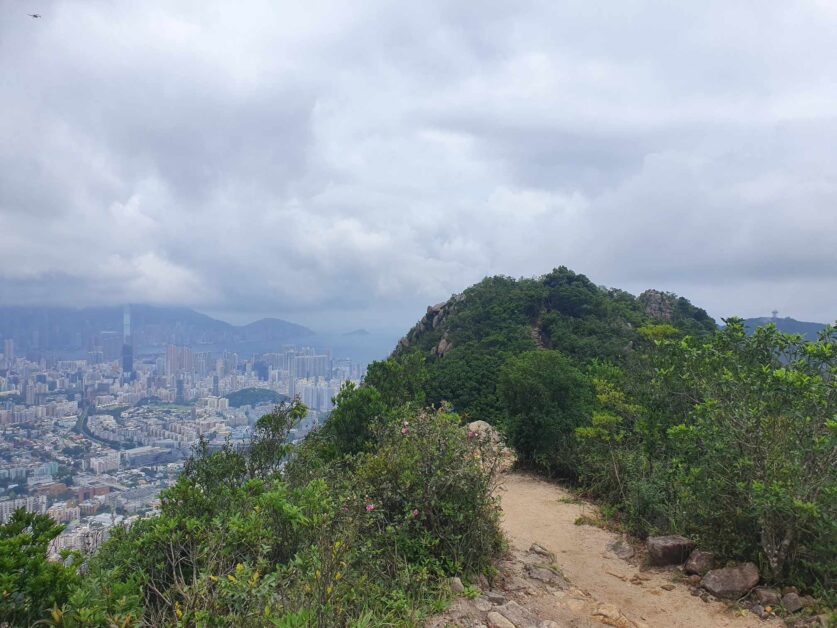
When choosing a city to live in, you’ll typically find yourself having to compromise on one or more natural landscapes. Not in Hong Kong. One minute, you can be in the heart of the financial district tossing back double espresso while donning a three-piece suit, the next, in your bright yellow speedo (my Italian buddies love wearing speedos) drinking a Peroni (or surfing) at a beach or hiking to the top of a mountain with a picturesque view.
One thing that many people don’t know is that nearly 40% of Hong Kong’s land is designated for country parks or special areas for fauna, flora, and nature, so you’re never really more than a stone’s throw away from a natural safe haven or oasis.
I personally start (almost) every Friday out with a hike (or walk – this is a contentious debate amongst expats) up to the top of the Peak and sometimes High West. I simply step foot outside my door and can be atop the Peak within 30 minutes if I hustle. I can also take a minibus/bus or taxi to the beach and be there within 20 to 30 minutes (or my preferred method, hiking there).
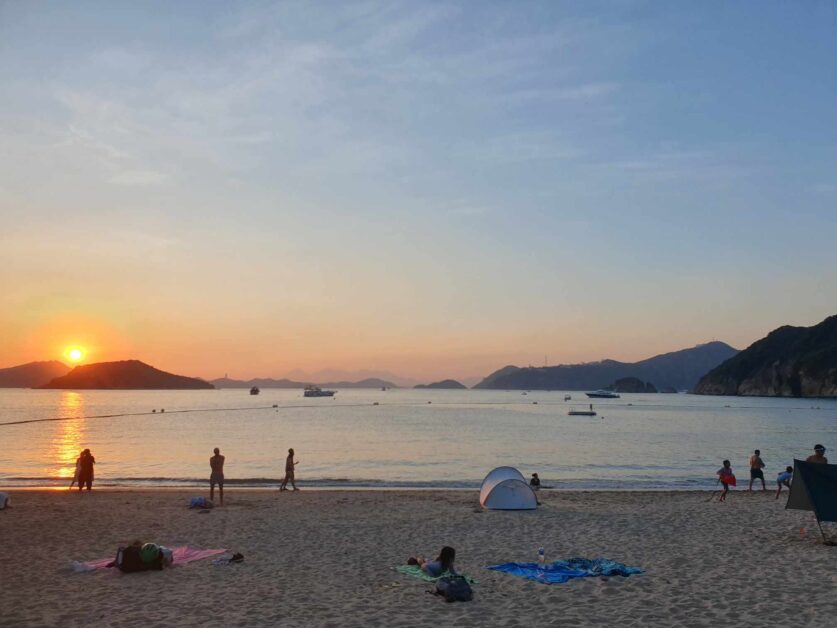
Hong Kong’s affordable and extensive public transportation network makes accessing whatever natural wonder your heart desires more than viable and a part of everyday life for both expats and locals. From Buddhist gardens (like Nan Lian Garden) and marine parks to long-distance hiking trails (ex. The MacLehose Trail clocking in at around 100 km) and twenty-plus major country parks, the juxtaposition (and proximity) of the crowded financial districts with towering skyscrapers and tranquil nature is one of the most attractive parts of Hong Kong.
Pale Ale Travel Tip: Looking for something to do with your partner this weekend? Make sure to check out my article breaking down my favorite Hong Kong date ideas.
Con: Wet Bathrooms (For Some)
One thing that may catch you off guard is that because many of the buildings that you may rent an apartment in are so old or small, that you may concede and end up with a wet bathroom (where there is no divider or separation between the toilet and shower).
No, this isn’t like those boutique waterfall showers or wet bathrooms you see Gwyneth Paltrow using in her L.A. mansion. These are gritty, sometimes smelly, iron-rich water tanks (often plopped or hanging right over the toilet) that will soak your entire bathroom floor and cause you to invest in several pairs of bathroom slippers.
Hong Kong is so damn hot though that it will dry up quickly.
Pro: Bustling Nightlife

I am definitely getting older so I can’t keep up like I used to but what first drew me to Hong Kong in 2012 (at the ripe old age of 21) was the vibrant nightlife scene that seemingly never sleeps. Walking down the back alley steps from Wyndham Street to that little perch that overlooks Lan Kwai Fong to get a glimpse of the crowds for the night was a pre-going out ritual that still sends shivers down my spine liver to this day.
From late-night bass-thumping EDM clubs and warehouse raves to classy rooftop bars overlooking the harbor and not-so-secretive speakeasies, all the way to hundred (or thousand) person gatherings outside of Lan Kwai Fong 7-11s for tins of San Miguel beers and cheap soju and dice and darts bars over in Causeway Bay or Kowloon, there’s literally something for everyone here.
Oh, and how could I forget the infamous HKD$10 Coronas on Wednesday nights in Wan Chai – I think this is still a thing at Carnegie’s.
Con: Disappearing Cantonese Traditions & Built Heritage
While Cantonese, the language, is still spoken by an estimated 80 million people worldwide (primarily Guangdong Province and Hong Kong), Hong Kong traditions, cultural heritage, and other infrastructure are on a swift decline. Hong Kong is running out of land to develop so it’s no surprise that the likes of Sun Hung Kai and Sino Group (among countless other real estate developers) are turning towards dismantling built heritage in the name of building a new mini-mall or office space. This inevitably seeps down into the erosion of intangible heritage and in my opinion, what makes Hong Kong, “Hong Kong.”
For example, as of the date of publication, there are only 20 or so ‘dai pai dongs’, open-air food stalls, left in Hong Kong. In my early years in Hong Kong, these were bustling, thriving affordable dining institutions that best exemplified Cantonese and Hong Kong culture. For reference, there were hundreds, even thousands of dai pai dongs in the 1950s through 70s in Hong Kong.
However, in the early to mid-1970s, the government began restricting dai pai dong and other food stall licenses, citing hygiene, noise, and space issues. Add in the fact that licenses are only transferable between spouses, and there has been a firm government push to buy back licenses (with ‘alleged’ ulterior motives to develop that area for commercial purposes – cough…West Kowloon Cultural District…cough’), I’m not sure just how much longer this favorite pastime will exist.
The above is just a microcosm of a more widespread dissipation of Cantonese traditions and infrastructure. I could also cite the stiff decline in cha chaan tengs (traditional diners) due to exorbitant rents and growing international culinary tastes, the closing of popular cooked food markets, and even talk of the iconic Star Ferry sailing its final trip across Victoria Harbour (a 55% fare increase was recently enacted to hopefully prevent this from ever happening).
I’d also be negligent not to acknowledge that Hong Kong’s ‘Antiquities and Monuments Ordinance’ is an extremely weak piece of legislation when it comes to protecting built heritage in this city due to its arbitrary grading tiers (for statutory protection and preservation), vague terms and language (that has not been adapted or refined to improve protection), and government’s unfettered discretion to override statutory protections. This makes it not only a threat to Cantonese “built heritage” but British “built heritage” as well.
Pro: Dai Pai Dongs, Yum Cha, & Local Staples
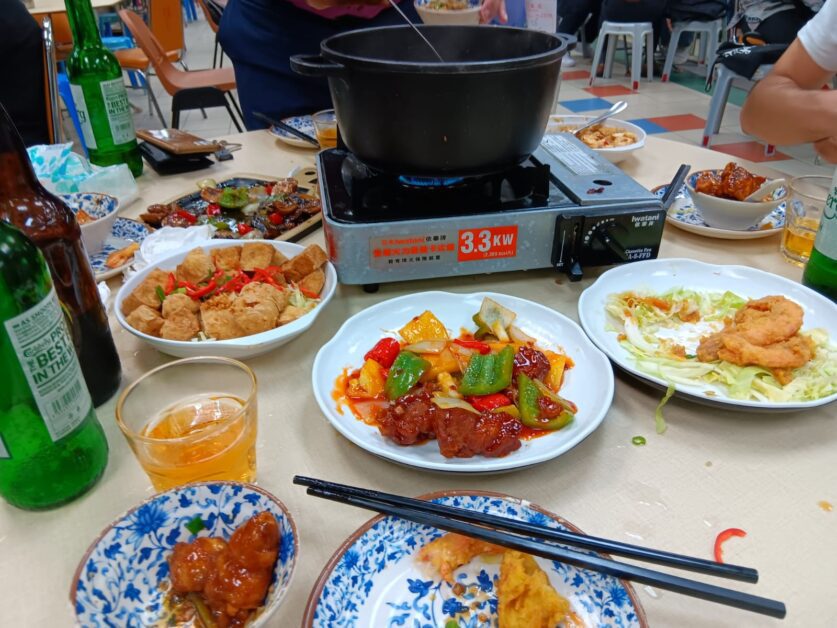
While some Cantonese gastronomic institutions are unfortunately rapidly closing their doors and being tossed to the wayside in furtherance of government agenda and profit, they are still to be celebrated (while they are still here).
Just recently, I had one of the most memorable nights in a long time after returning to the Sheung Wan Cooked Food Market with my dawgz – an indoor market with produce, meat, and other goods that also boasts a massive cafeteria to serve several Cantonese stalls serving up classic dishes. Late-night dim sum is also one of my favorite activities (especially after a bender in SoHo or Kowloon, one of my favorites being Sheung Hei in Kennedy Town, which serves up dim sum staples like siu mai, grilled radish cakes, and chicken feet. They are also known for their claypot rice.
Or maybe you are in the mood for self-serve yum cha out in Tai Mo Shan or room-temperature Blue Girl beers and assorted seafood out at Temple Street, Hong Kong still is a city to be reckoned with when it comes to exploring these staples.
Con: One of the Biggest Wealth Disparities in the World
There’s a lot of money in this city, evidenced by the hundred million dollar houses atop Victoria Peak or down in Repulse Bay, the concentration of the highest number of Rolls Royces in the world, and the ungodly expat salaries I wrote about above. But there’s also a staggering number of residents who never see a penny of it.
Prior to the pandemic, Hong Kong already had one of the largest wealth gaps in the world, with the top 10% earning 40 times more than the bottom 10%, an estimated 200,000-plus people living in the notorious subdivided flats commonly referred to as “caged homes,” and nearly 1.4 million residents (of the city’s 8 million) living below the poverty line.
This was only worsened with the pandemic, with the top 10% earning nearly 60 times the bottom 10% and the wealth gap reaching a ten-year high. And that isn’t even taking into account the diligent migrant workers and domestic helpers (typically from Indonesia, Malaysia, and the Philippines) who effectively operate as indentured servants for middle to upper-class families for a pittance of HKD $6,106 per month (minimum allowable wage plus food allowance as of September 2023).
Pro: English is No Problem
As a former British colony, English is one of the two primary languages spoken in Hong Kong (along with Cantonese). An estimated 65% of Hong Kongers (according to the Government Census) are able to read, write, and speak English. Keep in mind that the degree is not specified and most English curriculums still don’t pass muster when it comes to ‘readying pupils for subsequent studies or the job market’.
I’ve definitely exaggerated my language skills at various points in my life so take the numbers as you will. The point is that English will do you just fine in most (if not all) parts of the city, at least when it comes to survival.
All road signs are in Cantonese and English, major government documents and business materials are issued in both languages, and English/Cantonese menus are common throughout the city.
I’ve said this several times and I’ll say it again, you can have whatever type of day you want to have in Hong Kong. If you only want to go the entire day speaking English and eating Western cuisine, you can easily do that. If you only want to speak Mandarin or Cantonese and eat Asian or local, you can easily do that as well. If you want a hybrid of the two, then this is the perfect city for it.
Con: The MPF Kind of Stinks
While salaries run far higher than average compared to other cities across the globe and tax rates are so low that they make Fins and Austrians consider never returning home, Hong Kong’s retirement scheme, the Mandatory Provident Fund (MPF) has been widely criticized and mocked for its abysmal retirement protections, investment performance (errr…underperformance), and withdrawal difficulties.
The MPF looks something like this: for monthly full-time employees, employers must contribute 5% of the employee’s relevant income (up to HKD$1,500), while an employee must also contribute 5% (up to HKD$30,000). Expats can withdraw their MPF when they’ve decided to leave Hong Kong for good or turn 65.
Originally designed to provide retirement security for working class blue collar types in the city, the MPF has been labeled by some as nothing more than “entrenched cronyism between policymakers and the private sector,” with inept money managers and fiduciaries at the helm only out to line their pockets and milk it as long as they can.
Pale Ale Travel Tip: There’s a few things that I wish I knew before moving back to the city. These aren’t administrative tips. Rather, these are several powerful reflections after moving back to Hong Kong at 30 years old.
Pro: It’s Easy to Register a Company
Previously (and universally) touted as the world’s ‘freest economy’, it is a straightforward and frankly, affordable process to register and set up a company in Hong Kong. As one of the top 5 most expensive cities on earth, there are a surprising number of small and midsize enterprises (nearly 400,000). That wouldn’t be possible if it wasn’t an easy process to register and maintain a company here.
To register a limited liability company by yourself, you can expect to pay roughly HKD$1,720 for the incorporation fee. If you’re really ambitious, you could have your company registered and set up within just several days (and you get to enjoy that corporate tax rate I mentioned above). However, there are other costs on top of this such as the appointment of a designated company secretary, opening of a company bank account, and business registration fee.
When opening my L.L.C. in Hong Kong, I went through my accountant and paid roughly HKD$16,000 for the professional services rendered, incorporation fee, business registration fee, and appointment of him as the company secretary. I know others who have paid considerably less and exponentially more.
Con: Long-Term Visas Are Difficult & It Isn’t Digital Nomad Friendly
I know some of my readers are heavily interested in the “digital nomad” lifestyle or are freelancers who live abroad and work on their own terms. Besides the prohibitive startup costs, rents, and lifestyle expenses, solidifying yourself legally (with a legitimate working visa) is not the easiest task. It’s not like Portugal, Costa Rica, or Estonia where simply providing proof of income, insurance, and passport-sized photos will get you in the door. It’s a process. That’s why it took me so long to get back to Hong Kong – as I wanted to do it legitimately.
I registered a company, saved as much as I could to show a certain amount in my bank account, developed and wrote a lengthy business plan, wrote lengthy explanations of how my business would help contribute to the Hong Kong economy, pledged to hire local talent, opened up a business account at a bank, and did about three to four other things that I’m probably forgetting. Even then, it wasn’t a guarantee that I’d be accepted and granted a visa. Sometimes, I’m still surprised that they keep granting me visas.
If you are employed by a traditional company, then there is no need for you to read this con, as that will all be handled for you and shouldn’t cause too many sleepless nights.
Pale Ale Travel Tip: If you’re living and/or traveling to Hong Kong and curious about ChatGPT accessibility, make sure to check out my post breaking down 3 easy steps to use ChatGPT in Hong Kong.
Pro: Efficiency in Restaurants
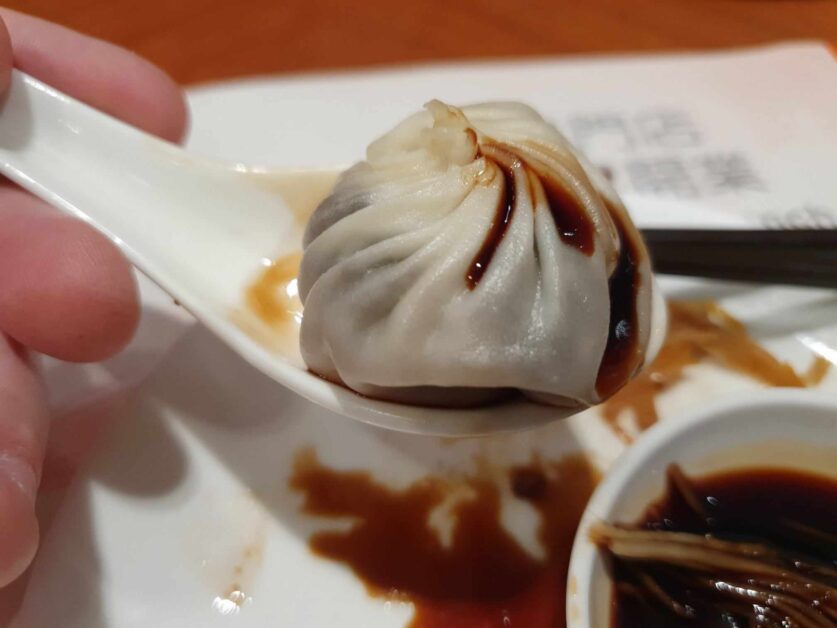
I think some expats (or travelers) who move to Hong Kong are put off by what they perceive to be general unfriendliness or rudeness by service industry staff. That’s not the case at all. Sure, they aren’t going to be your best friend like every clerk at the Buc-ee’s in Texas or Krispy Kreme in Ohio but they sure are going to get the job done and in a timely manner.
Being from New England, I personally prefer this type of service as I was raised on it. It’s one of the only places in the world where a Dunkin Donuts cashier will tell you to ‘Hurry up’ or toss an insult your way, right to your face. But they also will have your Extra Extra Extra large hazelnut latte and a box of munchkins ready before you even take out your wallet to pay.
I was at Korean BBQ with one of my top dawgz and he made a comment to the owner/manager of the restaurant in Cantonese. It was something along the lines of ‘Has it been busy lately?’. The owner, without missing a step and in the midst of topping up our banchan and makgeolli responds, “You have two eyes right? Then why ask me that question?” pointing to the queue of patrons waiting at the front and the fully packed restaurant floor. It was still one of the best meals I’ve had in a long time and we were in and out of the restaurant, stuffed to the gills, and happier than a pig in…a hot tub, within 2 hours flat.
I’ll take efficiency over niceties any day of the week.
Con: Lack of Efficiency in Banks & Government
I think the anecdote that best sums this up is after moving back in 2021, I tried to get a new debit card for an old bank account that I previously opened (and was still “technically active”). I went into the branch, presented my Hong Kong ID (and passport), explained my situation, and then was asked, “OK, to confirm this is you and to reactivate it, please let us know the date AND time you made X purchase and what it was for.” Incredulous, I responded, “I don’t even remember what I had for breakfast, let alone a debit card purchase I made 10-plus years ago.”
It took me about four hours of working my way through various employees, one of whom I had to call via a dedicated line (while I was in the bank, with bank employees) just to get this new debit card issued.
In Hong Kong, if you’re asking government offices or banks (and their employees) to depart from their highly rigid checklists in the name of accomplishing whatever task you are there to solve in an efficient manner, you are going to be in for a rough time and will inevitably question your sanity.
Pro: Everyone is Active
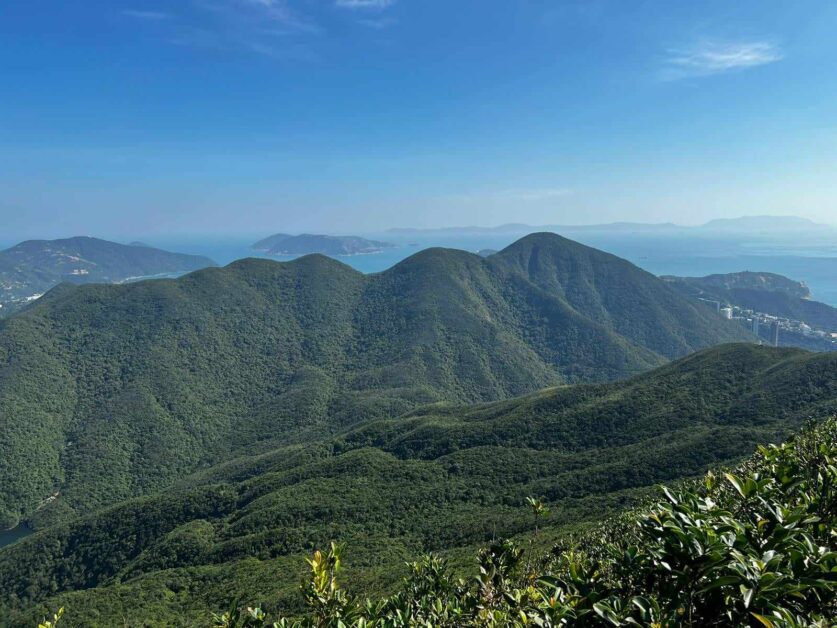
The proximity to nature, high concentration of gyms and fitness facilities, and densely populated pockets of the city make it an absolute haven for those who love staying socially, physically, or mentally active.
I’ve said this before and I’ll say it again, it is hands down the best city I’ve lived in (or maybe in the world) for getting fit and staying fit. Especially now in my thirties, most (if not all) of my friends have shifted primarily towards weekend hikes instead of late-night Lan Kwai Fong benders, trading the bottle for a bathing suit or bike.
The majority of hangouts with my friends (typically at their request) involve some sort of physical activity. The crazy part is that I still have a few friends who are able to not only get in a 20 km hike or gymnastics session on a Saturday but also muster up the energy for an all-night, booze-fueled ripper.
On the flip side of this, everyone’s extreme activeness can sometimes make it difficult to actually catch your breath. There can be an intense ‘FOMO’ in this city as you feel like you aren’t making the most of it or being as active as you should, just because some others are absolutely exercise and social demons.
Now that I’ve stabilized my internal constitution and tightened the cork in the bottle a bit better, I’m able to draw personal boundaries for activities and have found great joy in the days when I decide to post up on my couch, order Pizza Hut, and prioritize a mental and physical recovery day.
Pale Ale Travel Tip: Hong Kong is home to some of my favorite hikes in the world. Here are what I consider to be 9 of the top hikes in Hong Kong that are geared towards hikers of all skill levels!
Con: Air Quality
As I type this, PM2.5 concentrations are at 2.8 times the WHO’s air quality guideline value. At its core, PM2.5 is fine particulate matter that is 2.5 microns or less in diameter and poses a threat to the lungs and respiratory system. Pollution is one of the major downsides of millions of vehicles (one of the highest densities for vehicles on earth), pollutants that waft down from factories and plants in China, and local electric companies with enormous carbon dioxide emissions.
As a result, asthma and bronchitis infections have aggressively increased, air visibility has reduced significantly, and premature deaths have risen (with an estimated 3,000-plus deaths attributed to failing air quality).
If it’s any consolation, having lived in this city for six-plus years, I’ve never had any respiratory problems due to the air quality. Especially if I compare it to the chronic cough I developed after just three months in Beijing. But that doesn’t make it any less real.
Pro: Affordable Michelin Star & High-End Lunch Specials
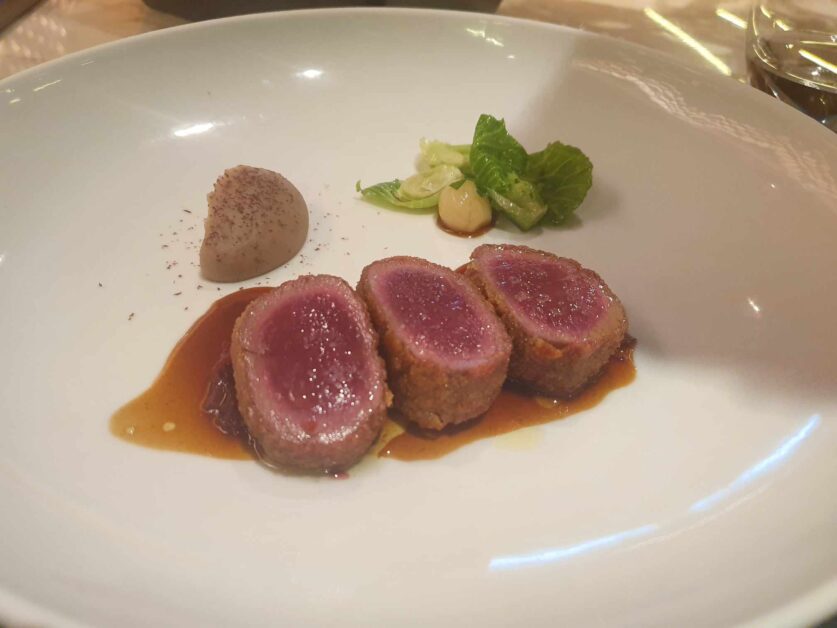
For being such a prohibitively and ungodly expensive city, it may have the best bang-for-your-buck Michelin star and high-end lunch specials of anywhere in the world.
Instead of staggering HKD$1,500 to $3,000 meals (without drinks), some lunch specials and tasting menus at world-renowned restaurants (such as 8 ½ Otto E Mezzo Bombana – The only Italian restaurant outside of Italy to earn 3 Michelin stars – pictured above) can be had for HKD$750 (roughly) or as low as just a couple hundred HKD, including the Michelin Guide recommended ‘IM Teppanyaki’, which boasts lunch sets as low as HKD$320 (give or take a few doll-hairs).
But for these affordable and reasonably priced lunch specials, there’s a high chance that I could go my entire life never having stepped foot into a restaurant classified as ‘fine dining’. Now, with that out of the way. I just don’t think that the same quality and price point extends to Western fare come dinner time. And this brings me to my next con.
Con: Overpriced Western Restaurants
I may catch some flak for this but overall I firmly believe that 90% of all Western restaurants (including non-local Asian restaurants) in Hong Kong are overpriced. Eating out in this city is expensive, so much so that an answer to this came in the form of the local “two-dish meal boxes” (clocking in around HKD$40) which have spread across the city like wildfire.
To be fair, it kind of has to be with the rents as astronomically steep as they are. Further, homegrown and locally sourced produce is minimal, labor costs are on the rise, and the market is definitely flooded with some of that Mainland money willing to pay more. But a part of me just fails to justify paying USD 30 for a simple sandwich or USD 60 for a schnitzel (granted, I still do and it’s delicious).
Even when it comes to other Asian cuisine, such as Japanese restaurants, it’s just, in my humble opinion, the antithesis of what really is the core message or cultural reason behind its existence.
For example, Japanese izakayas and yakitori restaurants are priced for the salaryman, meaning that they are an affordable option for those looking to get more than their fair share of food and drink (without breaking the bank). In Hong Kong, these same restaurants may leave you taking out a high-interest Macau junket loan just to pay the bill (this is hyperbole but I have encountered plenty of these types of restaurants which clock in at three to five times the price).
Pro: You’ll Meet Some of Your Best Friends
Hong Kong wouldn’t be what it is for me without ‘the dawgz’ (male and female). When you’re thrown into this densely populated melting pot that inevitably puts you and countless others through the wringer emotionally and financially, there’s a camaraderie that exists and develops quickly. Friendships and relationships can go from zero to one hundred (and back down to zero) before you can say “Beetlejuice” three times. Forged in fire they say.
The bonds that are forged though “hit different” than they do back home (that’s not me saying that they are better). I think a large part of it is that you’ll experience things in Hong Kong that just simply can’t be put into words. So when you have someone who has felt those feelings, smelled those smelly smells, made those mistakes, and saw those savory and unsavory sights, you can’t help but take to one another.
For some, that leads to lifelong friendships. For me, I think that’s the case as well. I’m extremely thankful to have been put through, and put myself through, these highs and lows, as I came out the other side with some true dawgz.
Con: May Be Isolating
Yes, you may be surrounded by nearly 8 million people at any given point in your day but emotionally and socially it can still feel isolating at points. As mentioned above, this is a fast-paced, transient city where friendships (or relationships) can dissipate before you’ve even had a chance to catch your breath.
You’ll inevitably have quiet nights, not by choice, where your friends or partner(s) are busy and you’ll stroll through SoHo seeing everyone out and about, laughing, drinking, convivial. You’ll grab your Kebab House or Motorino and settle in for a night feeling like you’re missing out on something spectacular.
If you’ve lived in Hong Kong long enough, you’ll learn that sitting “with the silence” and being okay with it is integral for preserving a sound mental state. At 33, I’ve had more than my fair share of moments where I had to dial things back, sit alone, reflect on behavior that just frankly wasn’t my best, and digest it. At this age, unfortunately, I’m noticing more than a handful of friends who have never had to confront that unsexy reality of turning into someone they never wanted to be (I’m still working on it on my end and always will be) and it’s really taking a toll on them (mentally and physically).
Be prepared to feel isolated and alone. But know that it is an opportunity that you might otherwise not have in a different environment. And I truly feel that the self-understanding and growth that comes from it is ultimately a positive.
Pro: Large Expat Population
I put this as a pro but I’m sure for others (and some locals) this may be a con. Attractive expat financial and compensation packages, 9,000-plus multinational companies (including top law firms, investment banks, and consultancies), a thriving nightlife and gastronomic scene, and easy access to the rest of Asia (for travel or business) make it a no-brainer for most expats weighing their options for an Asia relocation (here or Singapore).
However, there is an impermanence to many expats in the city and those who have mentally made the shift to move here full-time. On my end, this has resulted in a lot of temporary and fleeting relationships, where you feel like you never fully get into the groove of things with someone or are apprehensive about pursuing deeper friendships (due to fears that they will leave in the immediate future). But is also a key reason why the friends that you do meet and become close with may just be those roll dawgz for life.
Con: The Humidity is Off the Charts
When I first showed up in Hong Kong, I was averaging three showers per day due to the excessive heat and humidity. As I type this, I’m still averaging three showers per day. I thought it would get better. It doesn’t. At least not for me. It’s not even the heat per se that is unbearable but that sticky, thick, humid air that makes your skin feel as if there is a coating of watery primer on it is by far one of my least favorite things about living in this city.
To ensure that you don’t lose your best suit (and peacoat) like this bozo (me), you’ll need at least one or more humidifiers for your home. It still doesn’t fully register when I turn my humidifier on (daily), see it assess my apartment’s humidity level, and have it flash 95% humidity before my eyes.
Pro: Vibrant & Affordable Wet Markets
You don’t spend an arm and a leg like you’ll inevitably do at most Western restaurants just to eat quality and fresh ingredients in Hong Kong thanks to the vibrant and affordable wet markets that are sprinkled across the city. You can find everything from seasonal, locally sourced fruits and vegetables to full hogs and fresh seafood to everything in between at these wet markets.
My favorite is and will always be the ‘Graham Street Market’ in SoHo due to its convenience and pricing. However, the Kowloon City Market is Hong Kong’s biggest wet market that shouldn’t be slept on, even though it is generally a bit pricier than most other markets in the city.
A pro tip for the wet markets, learn a little Cantonese and hit the vendor with a good ole ‘What’s fresh today?’ and I guarantee you’ll end up with some of the best mangos, cucumbers, or other edible shrubbery that you’ve ever eaten.
Con: Overpriced & Poor Quality Supermarkets
The only real spots where I’ve fallen ill with some sort of food ailment are supermarkets. I made a comment about this to one of my local buddies who basically called me an idiot and told me how supermarkets are far less regulated and patrolled by health inspectors than they are at the wet markets. Think about it this way, you have individual proprietors at Hong Kong’s wet markets whose livelihoods rest on them serving a quality, hygienic, and safe product, meaning if they mess up, that’s it.
Supermarkets, on the other hand, are corporate chains continually looking to push the envelope with cost-cutting measures, all while jacking up prices for a lower-quality product. From what I know, there is a brand and product monopoly that does exist to some degree with supermarkets here, meaning that the bulk of chains out there are able to extortionately price – smuggling knowing that you are ultimately SOL and will keep coming back.
Pro: Easy Access & Flights to Anywhere in Asia
Hong Kong International Airport is one of the most trafficked airports in the world. There are more than a handful of reasons why – the major one being that Hong Kong is strategically positioned as a launching point that is almost within five hours (maximum) that you’d want to be in Asia. That means that weekend trips with the boyz to Taipei, long weekends in Bangkok…also with the boyz, or extended holidays with a partner to Japan are all the tips of your fingers.
Hong Kong also makes it extremely convenient to get to the airport. Simply hop down (or over) to Hong Kong Station and take the Airport Line for a total of just 24 minutes to be feet down at Terminal 1 or 2. This TatlerAsia article breaks down a handful of travel destinations that are all within a 5-hour flight (or less) from Hong Kong.
Con: Too Crowded & Easy to Feel Claustrophobic
Parts of Hong Kong sport some of the most densely populated areas on earth, so it’s inevitable that you’ll step out the door at points and feel as if you can’t breathe. I live in Mid-Levels, a stone’s throw away from Central, Admiralty, and the major points of the hustle and bustle of Hong Kong Island, and occasionally find myself tight in the chest thinking about the tens of thousands (if not hundreds of thousands) of people that I’m set to pass by in my daily routine.
Even lesser central areas can be hectic. Packing into the MTR or buses like sardines ready for a Big Body Balkan breakfast or a short errand to Causeway Bay or Mongkok (two of the most densely populated districts in the world) is enough to make you want to never step foot out the door again. Just ensure that you have a little slice of Hong Kong that you can escape to should you feel like the walls are physically or emotionally closing in on you.
Pro: The Best Skyline in the World
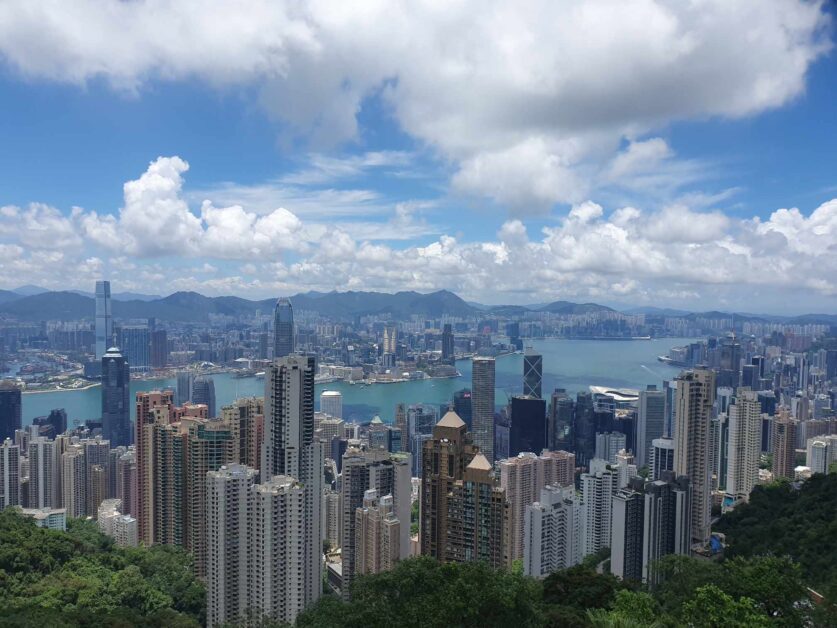
I’ll die on the hill that Hong Kong’s skyline is the best in the world. It doesn’t matter which side you view it from, you’re in for a treat. I have several favorite vantage points. The first is from the top of High West or The Peak, which looks over both the Hong Kong Island skyline and the cross-harbor Kowloon skyline. My second favorite spot is along the Tsim Sha Tsui promenade (specifically at one of my favorite al-fresco bars ‘Ink’). The third and final spot is on the Hong Kong Island side, coming down the promenade and waterfront from Tin Hau.
After a long stressful day, one of my favorite decompressing activities is to walk down to the Star Ferry, ride it across the harbor to Kowloon, grab a beer at Ink Seafood Cafe, and then circle back to the Island the way I came. It’s a reminder of things that are bigger than myself. The flashing lights, the towering skyscrapers, and the black night sky, all in one panoramic view. Sometimes there’s a mist that floats up off the water. It’s ethereal.
Even after six-plus years of looking at this skyline, it doesn’t feel real at points. The magnitude of it all instills a sense of vigor, excitement, and hope in me, which even if somewhat fleeting, are feelings that affirm I’m in the right place (and home).
Con: Gym Memberships
This may be controversial as well but gym memberships in Hong Kong can be a pain in the ass. I think it is widely reflected that a majority of those with gym memberships across the city feel as if they aren’t getting the value of what they are paying for a membership.
For example, the gym that I frequent and have been a member of on and off for the last ten years has (a) upped the price by an extra USD 50 per month, (b) reduced the cleaning and hygienic amenities (ex. Spray bottles to wipe down equipment, (c) has limited the clothes they provide to patrons or is sometimes completely out of them, (d) has seen a sharp decline in the quality of the equipment, and (e) downsized space and workout areas that non-class participating members can use.
Further, two of the three gyms that I’ve paid for a membership at have gone under (with minimal notice). One of which, I paid two years upfront to receive a discount. So, it can be a fickle, cold landscape when it comes to choosing a gym that won’t screw you over or go under AND meets your fitness or equipment needs.
At least give me some extra sanitizing spray if you are jacking up prices by USD 50 per month. For further reading, make sure to check out my article breaking down ‘How to Choose the Right Gym’ in Hong Kong.
Is Hong Kong a Good Place to Live?

Absolutely. It’s my home. It’s the only place outside of the state where I was raised (New Hampshire) where I feel truly in my element personally, professionally, and spiritually (I don’t really know what spiritually means for me at the moment but something’s there). I have no plans to leave this place – unless something drastic happens (again) or they physically drag me out of the city.
Nowhere is perfect. I spent a considerable amount of time reflecting during my three months in Japan (because I didn’t speak any Japanese and decided to go “monk mode”) and since returning to the Orient Pearl, I feel like a switch has flipped. Even the quotidian struggles and irritations don’t seem to get me into a funk (or as much of a funk) these days. I’m appreciative to be here. It’s somewhere I spent years working to get back to and I’m not going to take that for granted.
I’m still as in love with this city as I was the first night I arrived, enamored by the illustrious skyline, humidity, and almost suffocating warmth, and palpable day-time and nightlife energy. A cover band at The Conrad where I was staying belted out Jessie J’s ‘Price Tag’ as I checked in – a ballad that seemed to perfectly foreshadow my future woes and stresses in this city.
If you’re living in Hong Kong, have lived here, or have even traveled through, I’d love to hear your thoughts in the comments (or via email: info@palealetravel.com) about what you consider to be the pros and cons. The above pros and cons of living in Hong Kong are primarily based on my experiences so I would definitely like to know what you found enchanting, disconcerting, or somewhere in between.
Stay well everyone,
Big Body
Big Body is a voracious lov…eater, a cowardly fighter, and a self-proclaimed curry goat BBQ-eating champion (don’t forget the donkey milk) who likes Stoicism, baseball, and writing in the third person. Having worked for himself for the last 7 years, he isn’t particularly successful but he does still drink ice-cold Sapporo draft beers with the best of them and knows his way around a Dai Pai Dong or two. He is based in Hong Kong but you can still find him in Saigon, Osaka, and Vienna for extended periods.
